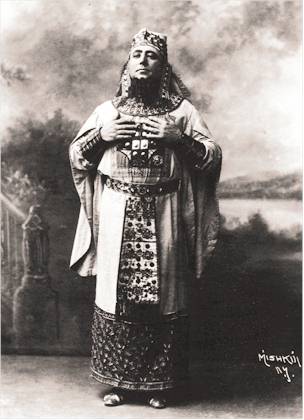  |
| Spanish opera singer Jose Mardones (1869-1932) as Ramfis in "Aida" by Verdi (Photo credit: Wikipedia) |
HOW OPERA IS PERCEIVED
Opera has been performed in the UK since the 1700's but for many, it is stuck in the 18th century and is the pastime of the rich and snobby elite. Art forms like opera are shrouded in mystery and mystique.
However opera is still very popular and just like the past for numerous reasons - Escapism and a combination of things for people to enjoy - music, singing, acting, costumes - plus it can be a social event. Interest in opera is growing, especially among younger audiences.
Opera is one of the most all-encompassing art forms - there is more than enough to appeal to everyone. Anything that introduces a new audience to this wonderful art form they haven't encountered before is a fantastic opportunity.
WHAT IS OPERA ABOUT?
In opera, you can find the same emotions that we experience in our daily life (jealousy, impossible love, betrayal, friendship, love-duty conflict...) By identifying ourselves with the characters and the situations they go through, we can recognize in them part of our own being. In that sense, opera can be a means to better get to know ourselves.
The big emotional impact that it can trigger is what makes opera a source of such a powerful intense enjoyment that leads so many people in the world to fall in love with this great performing art.
WHICH OPERA SHOULD I CHOOSE TO SEE FOR MY FIRST TIME?
As there are over 2,500 operas that have been composed, our advice would be to start at the "shallow end" with going to see a popular opera that has a grand story and big tunes - Carmen by Bizet, Madam Butterfly by Puccini, The Marriage of Figaro by Mozart.
Before you go to a performance find out the story-line, listen to some of the famous arias in advance on a recording and you will appreciate the live performance so much more.
There are plenty of places to see opera from the more traditional - Opera houses to the more cutting-edge cinemas and even pubs (Cock Tavern/King's Head) if you are on a lower budget.
You'd be amazed how much opera you probably know already:
- "Nessun Dorma" from Tosca by Puccini- made famous by the Luciano Pavarotti for the 1990 FIFA world cup - Hear Puccini's Nessun Dorma in the movies Chasing Liberty, Man on Fire, and Bend it like Beckham.
- "Flower Duet" from Lakme by Delibes - made famous in fairly recent British Airways adverts - Hear Delibes's Flower Duet in the movies The American President, Tomb Raider: The Cradle of Life, and Meet the Parents.
- "Lascia Ch'io Pianga" - Rinaldo - Handel - the famous Harrods advertisement theme tune.
- Renee Fleming singing Un Bel Di from Madam Butterfly in Fatal Attraction
- Ride of the Valkyries from Die Walkure, Wagner - Featured in cartoons and movies, and everything in between, children and adults alike are very familiar with this piece. To many, Ride of the Valkyries represents the stereotypical large opera female festooned with braids, horned helmet, and metal breastplate with a spear in hand. Hear Wagner's Ride of the Valkyries in the movies Apocalypse Now, The Blues Brothers, and Full Metal Jacket.
If you want to hear and see a selection of the "very best opera arias" go to a popular opera gala. There is normally a sit-down meal and wine and it's a fantastic way to hear some of the best operatic repertoires whilst enjoying a delicious meal and it's an opportunity to hear and see professional opera singers live, up close.
  |
| Postcard - Russian opera singers Vasily Vasiliev (Vasiliev the 2nd; 1837-1891), Melnikov, Yalmar Frei (born 1856) in opera "Pique Dame" by Tchaikovsky (Photo credit: Wikipedia) |
Another way to hear and see opera singers up close is to hire
Singing Waiters and Waitresses to entertain and surprise your guests. They are very popular surprise entertainment at wedding receptions, corporate events and private parties.
THE MYTH OF FAT OPERA SINGERS
The picture in your head an image of an opera singer. Like many people, you may see the stereotype of a fat lady in an extravagant gown belting it out like there was no tomorrow. Why are opera singers fat? Or, to be more accurate, why is there such a stereotype about opera singers?
There are several theories attempting to explain why opera singers were often pleasingly plump. One holds that a large amount of fatty tissue surrounding the voice box (larynx) increases its resonance capability and thus produces a more pleasing sound. The amount of this fatty tissue varies from singer to singer. It is almost impossible to have a great deal of fatty tissue around the voice box without carrying a great deal of fatty tissue elsewhere on the body.
A second theory holds that opera singers need a far more powerful diaphragm than normal to be able to project their voice above the sound of a large orchestra in a large opera house. A large chest cavity and good control of the lungs will provide a suitable mass to help drive the diaphragm to some extent. A large body mass and a large body frame to support it help even more, so there is a huge advantage in being huge.
There are countless slim, attractive opera and classical singers, male and female. The "fat lady singing opera" is a stereotype. Just look up Anna Netrebko, Elina Garanca, Kate Royal to name just a few.



